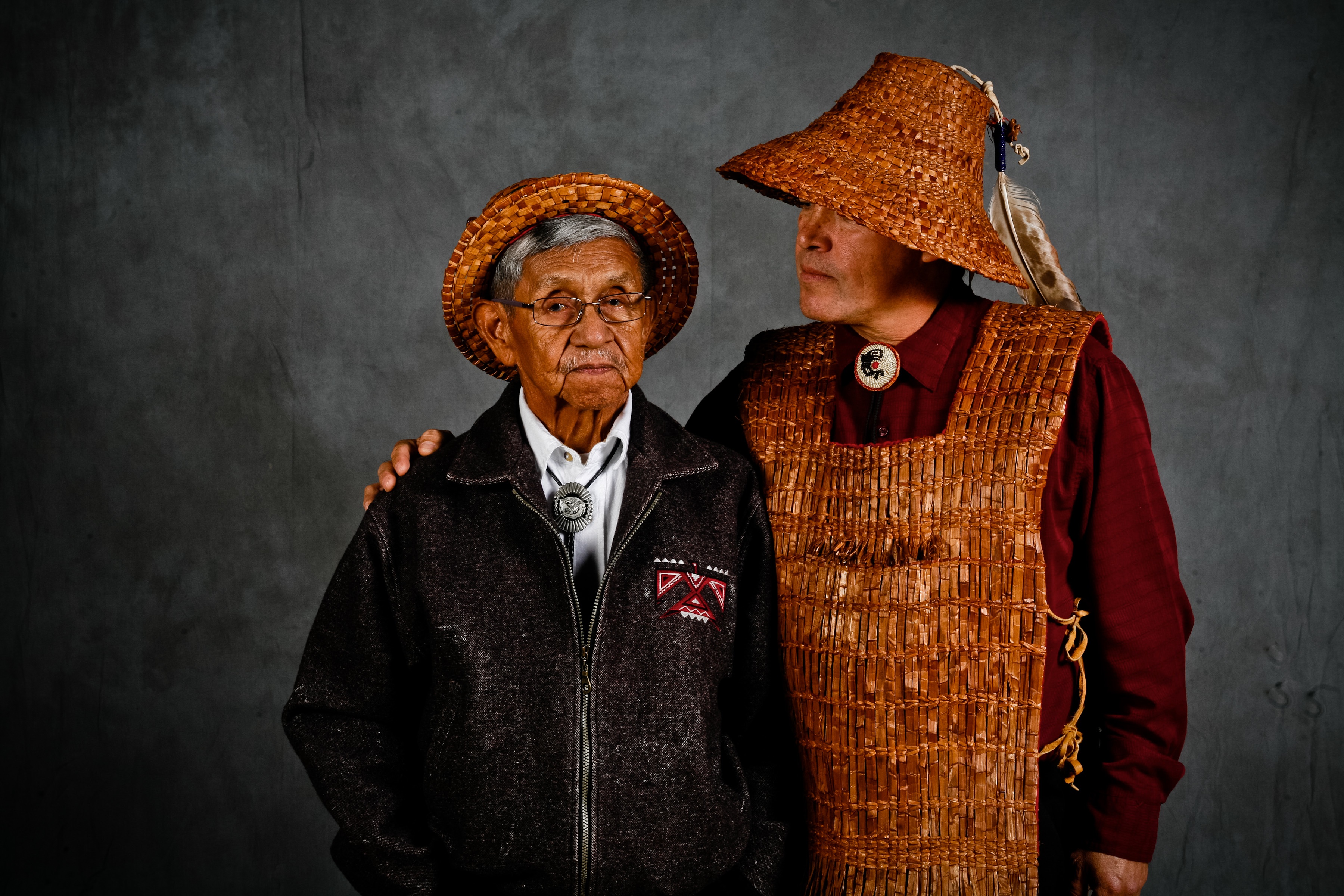Honoring Our Fathers
Honoring Our Fathers

As we get ready to honor our dads this Father’s Day, we at AIANTA queried our tribal partners and other language experts on how to address male family members in their Native languages. (We extend warm thanks to everyone who helped contribute to this and all our indigenous language posts.)
We had a great response (see below), but it’s never too late to contact us to add your own language to our list.
Aleut, Eastern Dialect, Alaska
| English | Singular | Posessive |
| Father | Ada{ | Adang |
| Grandfather | Latu}i{ | Latu}ing |
| Son | La{ | Lang |
| Brother | Braata{ (Russian loan word) | Braatang |
| Uncle | Yaaya{ (Russian loan word) | Yaayang |
| Nephew | Umni{ | Uming |
Aleut, Western Dialect, Alaska
| English | Singular | Posessive |
| Father | Ada{ | Adang |
| Grandfather | Latu{ or Latu}i{ | Latu}ing |
| Boy (also Son) | Hla{ | Hlang |
| Brother | Huyu{ (Her Brother) | Huyung (My Brother) |
| Uncle | Ami{ | Amiing |
| Nephew | Umni{ | Umnii |
Catawba Language, Catawba Indian Nation, South Carolina
| Father | nane (nah-nay) | |
| My Father | nanena (nah-nay-nah) |
Chickasaw, Oklahoma
| Father | inki |
Inupiat Language, North Slope, Alaska
| Father | Aapa | |
| Older Brother | Apiyaq | |
| Siblings | Aaviliatkutat | |
| Younger Brother or Sister (plural, both sexes) | Nukaaluq |
‘Ōlelo Hawai‘i (Hawaiian Language), Hawai‘i
| Father | Makuakāne | |
| Grandfather | Kupunakāne | |
| Son/Boy | Keikikāne | |
| Brother (generally, and to a sister) | Kaikunāne | |
| Older Brother (to a brother) | Kaikuaʻana | |
| Younger Brother (to a brother) | Kaikaina | |
| Nephew (or Niece) | ʻOhana Keiki |
Mahican Dialect, Stockbridge-Munsee Tribe of Wisconsin
| noox | ||
| My Grandfather | muxoom | |
| My Son | ndayoom | |
| My Older Brother | neetaʔkun | |
| My Younger Brother (same word mother’s sister’s son) | nxeethim | |
| My Uncle (father’s brother) | nãacheʔkw | |
| My Uncle (mother’s brother) | nseeth | |
| My Nephew | nookwuth |
Mohawk, New York
| My Father | rake’níha | |
| Your Father | ia’niha | |
| His Father | ro’niha | |
| Her Father | ronwa’niha | |
| Dad | rákeni | |
| My Grandfather | rakhsótha | |
| My Younger Brother | ri’kén:’a | |
| My Older Brother | rakhtsí:’a | |
| My Uncle | rakenonhá:’a | |
| My Nephew | riionhwatén:’a | |
| My Grandson | riiateré:’a |
Northern Paiute, Nevada
| Father | Na’a | |
| Grandfather (moher’s father) | To go’o | |
| Grandfather (father’s father) | Kuno’o | |
| Uncle (mother’s brother) | Aatse | |
| Uncle (father’s brother) | Hi’e |
Tiwa/Northern Tiwa, Taos Pueblo, New Mexico
| Dad | Dama |
Tlingit, Sitka Tribe, Alaska
| My Father | Ax Éesh | |
| My Grandfather | Ax Léelk’w | |
| His/Her Son | Du yéet | |
| His Older Brother | Du Húnxw | |
| Her Brother | Du éek’ | |
| His/Her Paternal Uncle | Du sáni | |
| His Sororal Nephew | Du Kéilk’{ |
Tunica, Tunica-Biloxi Tribe of Louisiana
| Father | esiku | |
| Grandfather | ihchaku | |
| Son | imilaku (affectionately, “my boy”) | |
| Brother (Same Sex Sibling) | ihtat’ɛku | |
| Brother (Opposite Sex Sibling) | ɛhɛyaku | |
| Maternal Uncle | ikiku | |
| Maternal Aunt’s Husband | esisahuku | |
| Older Paternal Uncle | esit’ɛku | |
| Younger Paternal Uncle | esitohkuku | |
| Nephew (Sister’s Child) | ehtohkuku | |
| Nephew (Brother’s Child) | ehkutosahuku |
Twulshootseed, Puyallup Tribe of Indians, Washington
| Father | bad | |
| Grandfather | scapaʔ | |
| Uncle | qəsiʔ |
Note: The words and phrases in this post were provided by members of the tribes listed. Spellings and translations may vary. Some words may be missing accents or symbols due to limited characters on a keyboard.
We’re happy to add your language and/or hear corrections and suggestions on spellings and translations, so feel free to contact us at info@aianta.org.
Year of Indigenous Languages
Learn more about the year of Indigenous Languages and view more posts in AIANTA’s Native Greetings series here.
Photo credits: Top photo: Cherokee Nation; Feature photo: Brian Cladoosby, Swinomish Tribe (c) Ecotrust, Flickr.com.